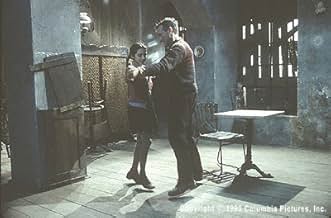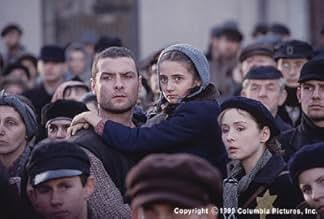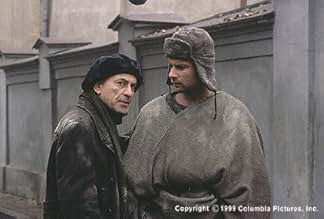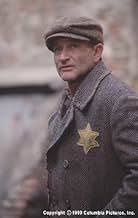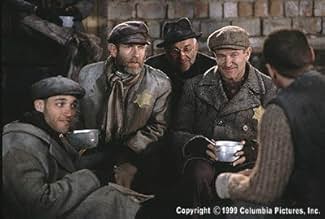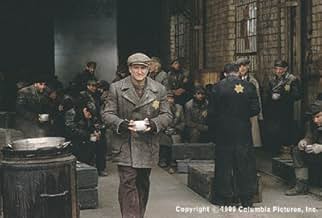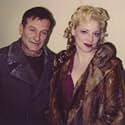Durante la II Guerra Mundial, un habitante normal de un barrio marginal se inventa noticias sobre las ofensivas de los Aliados para dar esperanza a otras víctimas del régimen nazi.Durante la II Guerra Mundial, un habitante normal de un barrio marginal se inventa noticias sobre las ofensivas de los Aliados para dar esperanza a otras víctimas del régimen nazi.Durante la II Guerra Mundial, un habitante normal de un barrio marginal se inventa noticias sobre las ofensivas de los Aliados para dar esperanza a otras víctimas del régimen nazi.
- Dirección
- Guionistas
- Elenco
- Premios
- 2 premios ganados y 3 nominaciones en total
- Lina's Mother
- (as Eva Igo)
- Lina's Father
- (as Istvan Balint)
- Samuel
- (as Janos Gosztonyi)
- The Whistler
- (as Adam Rajhona)
- Roman
- (as Peter Rudolf)
- Dirección
- Guionistas
- Todo el elenco y el equipo
- Producción, taquilla y más en IMDbPro
Opiniones destacadas
The truth is, JAKOB THE LIAR is an incredible film in its own right. I've read/seen many other Holocaust testimonials (including MAUS and the aforementioned LA VITA E BELLA), but this was by far the most stirring of any of them. I was especially impressed by Robin Williams' performance. Granted, I'm partial to him, but I was completely bowled over by this performance. I believe this is the darkest and most serious role he has ever done, but he pulls it off magnificently.
Don't believe the nay-sayers on this one ... this is incredible. It's a must-see for everyone. Would I lie to you?
Of all the films in the Holocaust corpus this is one of the few that reflects with fantasy and imagination and humor what suffering means in Jewish culture. One can argue that films about the Holocaust necessarily are depressing (or must have that Hollywood lift of hope - why?! - there was no hope) - but here there is a genuine attempt to speak into the culture of Ghetto Judaism and refer back to Aleichem's wonderful mix of family, suffering, and laughter.
The film is not wholly successful - the humour is wry, but it never quite gets to the sorrow in it, and replaces that with genuine sorrow. However it defies our norms of this style of film and as such, very correctly, challenges our notions and images of daily life outside the camps.
All in all this rewards viewing at a deeper level than simply a man who invents a radio to give others hope - it is a real reflection of pre-war Judaic humor and as such is a very worthwhile attempt to preserve the deeper meaning of a Jewish understanding that humor is one of the better ways, and sometimes the only way, to cope when darkness falls.
Things do not appear to be going well within the ghetto, the war seems like it will never end, and morale among the imprisoned Jews is steadily waning, resulting in suicides left and right. As Jakob finds a friend of his doing something that will certainly get him killed by the Nazis (this particular friend decided to make a ham-handed attempt at escape rather than overtly kill himself), Jakob runs to him and tells him that he heard on the radio that the Russians were closing in and would liberate them any day. His skeptical friend doubts him, so Jakob quickly tells him that he has a radio so that he will believe the Russians will be there to save them all soon, and his friend's suicide is prevented.
By the next morning, literally everyone in the ghetto knows that Jakob Heym has a radio, and so he is venerated like a God and constantly hounded about what the newest news is, and thus enters the main conflict of the movie. And speaking of which, one of the things that I really liked about the movie was the complexity of its conflict. It's a conflict that you sit there knowing what needs to happen for a happy ending and so you sit there and hope for that, because every option has terrible consequences.
Jakob, first and foremost, is absolutely terrified that word will reach the Nazis who will execute him if they discover he has a radio (whether he really has it or not), yet at the same time he can't let it get out within the ghetto that he DOESN'T have a radio, because since the whole rumor began the rampant suicides have completely ceased. What he has to do, then, is walk the fine line between delivering lots of fictitious good news to the whole ghetto without letting the Nazis find out about it.
There is definitely something that needs to be said about the importance of a movie like this. Obviously, holocaust movies are nothing new, and different depictions of the holocaust have been especially in the spotlight since Roberto Benigni made a holocaust movie called Life Is Beautiful in 1997, at least half of which was a comedy. A lot of people felt that it was distasteful to present something as serious and tragic as the holocaust in such a light. And not just average moviegoers like me, either. Spielberg thought it was too lighthearted for such weighty subject matter, and from a certain point of view, he's right. On the other hand, however, the fact that you laughed during the film does not change the meaning of the war that it focuses on. The Nazis killed funny people, too.
I read a review on the title page for Jakob the Liar here on the IMDb, where a reviewer who completely missed the boat on this movie criticized it for things like the comedic content, the behavior and presentation of the Jews of the ghetto, and the choice of Robin Williams for the role of Jakob Heym. To be perfectly honest, I can never understand people like that. The way I see it, as long as a movie takes the holocaust seriously then it should not be criticized for being a holocaust film that's not in the right format or that had an actor who has done too many comedy roles. This same reviewer, by the way, praised Life Is Beautiful, a spectacular film, as is Jakob the Liar.
I can certainly understand that there are people who are touchy about the holocaust. It is inarguably one of the most tragic events in all of recorded human history, made even more tragic by the fact that it was perpetrated by humans against other humans. It's sickening. But there are no jokes about the holocaust in Jakob the Liar. The Jews do not act like victims. It is historically accurate and does not compromise the truth of what happened for the sake of entertainment. It presents a story of a ghetto full of captive Jews who have had their lives stolen from them and are desperate for some hope, and one man tries to help and inadvertently finds himself in a position to provide massive amounts of hope to them, but at massive risk to his own safety.
So if you don't like to see Robin Williams playing serious, dramatic roles (roles at which he is increasingly displaying his massive talent ), don't watch the movie! It is neither a secret that Williams is in the movie, nor that it's a serious role. One look at the cover box will tell you that. But if it's the holocaust being taken seriously that troubles you, maybe you should be more concerned about the fact that there are people, alive TODAY, here in the 21st Century, and presumably relatively educated American citizens, who DO NOT BELIEVE THAT THE HOLOCAUST EVER EVEN HAPPENED. So like I said, if you're that concerned about the portrayal of the holocaust, maybe focus your efforts on these nutcases who have convinced themselves that the holocaust itself is just a fable. Maybe a myth that mothers started telling their kids to make them scared of Germans or some other such nonsense.
Jakob the Liar has no illusions, it takes a tragedy in human history and tells a story of a man who did what he could to help those suffering around him, and Robin Williams should obviously be commended for the power of his performance, as should the rest of the cast. The thing to keep in mind is that there is no certain perspective from which to view things like the holocaust. Everyone has different thoughts and feelings about it, and in the movies these different perspectives can be provided in different ways without compromising the severity and finality of the event itself. Jakob the Liar does not at all trivialize the holocaust in any way, what it does is honor the loss of its victims, who came from all walks of life.
Just speaking for myself, I wish everyone would educate themselves about this horrible episode in human history. If you have a friend who refuses to watch honest historical films, turn them on to Jakob the Liar. It IS Robin Williams, after all. For sure, this film will encourage them to learn more about the holocaust. Its very entertaining and does give some superficial insight into what the atrocity was all about.
Robin Williams did his best. He did a fine job in this film, and deserves even more credit just for making the attempt. On a scale of 1 to 10, I'd give it an 8.
¿Sabías que…?
- TriviaThis movie and Jakob der Lügner (1974) were both based on the novel "Jakob der Lügner," written in 1969 by the East German author Jurek Becker. As Jews, Becker and his parents were placed in a Polish Ghetto in 1939. In order to save him from deportation, his parents gave the Germans a false birth date; Becker forgot his real birth date and was never able to discover it later in life. Although he was eventually sent to the concentration camps Ravensbrück and Sachsenhausen, both he and his father survived the war; his mother died of malnutrition after being freed from the camp. His novel "Jakob der Lügner" won the Heinrich-Mann Prize for literature in 1971; Becker died in 1997 of cancer.
- ErroresThe train locomotive in the lower left-hand corner of the DVD cover artwork is correct for southern California when the movie was released in 1999, but it's totally wrong for the movie's setting in 1944 Poland. Its cab profile was used on various diesel-electric models built by General Motors for the North American market from the early 1960s onwards, it has 1990s-style dual low-mounted safety lights, and its red-and-gray paint scheme bears an uncanny resemblance to that used by the Southern Pacific Railroad in the western United States in the late 20th century.
- Citas
[first lines]
Jakob Heym: Hitler goes to a fortune-teller and asks, "When will I die?" And the fortune-teller replies, "On a Jewish holiday." Hitler then asks, "How do you know that?" And she replies, "Any day you die will be a Jewish holiday."
- Créditos curiososSpecial thanks to the city and peoples of Piotrków, Poland, the city and peoples of Lódz, Poland and the city and peoples of Budapest, Hungary.
- Bandas sonorasBeer Barrel Polka (Roll Out The Barrel)
Written by Lew Brown, Wladimir A. Timm (as Wladimir Timm), Jaromir Vejvoda & Vasek Zeman
Performed by The Andrews Sisters
Courtesy of MCA Records
By Arrangement with Universal Music Special Markets
Selecciones populares
- How long is Jakob the Liar?Con tecnología de Alexa
Detalles
- Fecha de lanzamiento
- Países de origen
- Idioma
- También se conoce como
- Una señal de esperanza
- Locaciones de filmación
- Productoras
- Ver más créditos de la compañía en IMDbPro
Taquilla
- Presupuesto
- USD 45,000,000 (estimado)
- Total en EE. UU. y Canadá
- USD 4,956,401
- Fin de semana de estreno en EE. UU. y Canadá
- USD 2,056,647
- 26 sep 1999
- Total a nivel mundial
- USD 4,956,401
Contribuir a esta página




